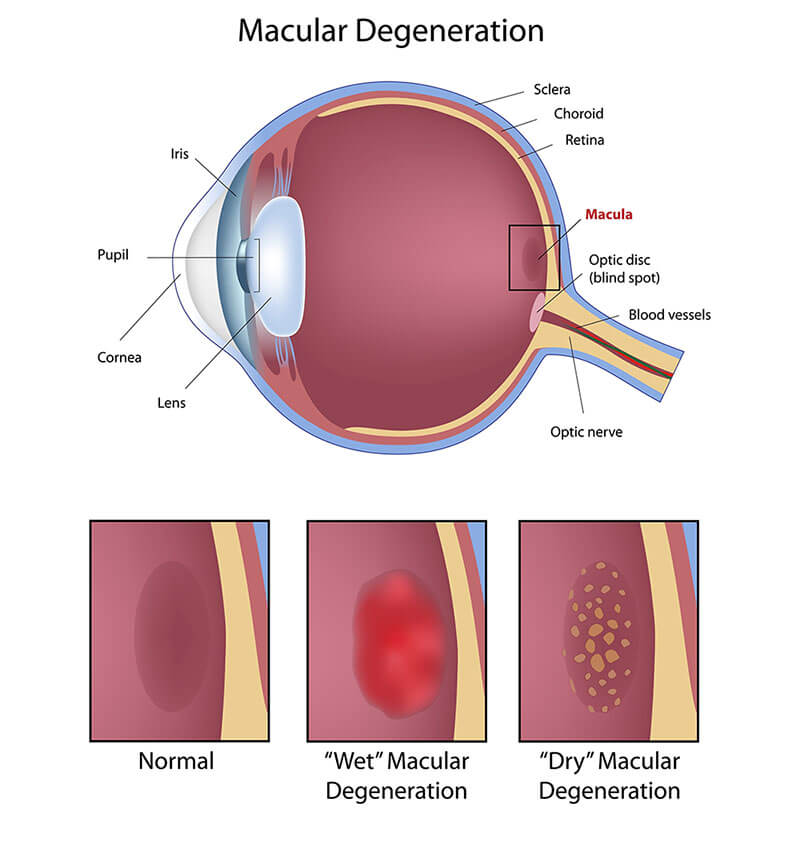Macular Degeneration, also known as Age-Related Macular Degeneration (AMD) is a common condition in older adults and is the leading cause of vision loss and blindness in people over the age of 65. Macular degeneration affects the macula, the part of the retina responsible for the crisp, detailed vision needed for reading or driving. As we age, the tissue in the eye responsible for central vision slowly begins to deteriorate which can significantly affect a patient’s quality of life.
Types of Macular Degeneration
Macular degeneration can be classified as either dry (non-neovascular) or wet (neovascular). Dry macular degeneration is more common and is considered to be an early stage of the disease. This type of the disease usually develops as a result of aging and thinning of macular tissues and the depositing of pigment within the macula.
Dry macular degeneration only progresses to the more advanced and damaging wet macular degeneration in about 10% of patients. Wet macular degeneration occurs when new blood vessels develop beneath the retina and cause a leakage of blood and fluid. This leakage can lead to permanent damages in the central vision and the creation of blind spots. Although less common, wet macular degeneration accounts for 90% of the blindness caused by all cases of this condition.

Symptoms
Patients with macular degeneration may notice gradual changes to their vision, including shadowy areas in the central vision, or fuzzy and distorted vision. These areas grow larger as the disease progresses and can eventually turn into blind spots. Difficulty seeing color and fine details may also be prevalent.
If macular degeneration progresses to the wet form, patients may see straight lines as wavy. At this stage, central vision loss can occur rapidly, sometimes in just a few days or weeks.
To avoid permanent damage, routine eye care is critical. Detecting macular degeneration and other serious eye conditions as early as possible can make all the difference. During a routine exam, your doctor may be able to detect early signs of macular degeneration before any symptoms occur.
Causes and Risk Factors
Many cases of macular degeneration are the result of aging and the natural deterioration of the central retina that is needed for clear vision. Gender, race and genetic factors also play a role. Other risk factors include light eye color, smoking, sun exposure, high-fat diet, hypertension, and obesity.
Patients can minimize their risk of macular degeneration by practicing a healthy, active lifestyle and having routine eye exams. Regular exercise, eating a balanced diet that includes omega-3 fatty acids (salmon, sardines, walnuts and Brussel sprouts to name a few), dark green, leafy vegetables, and avoiding smoking, are beneficial in preventing macular degeneration.
Detecting AMD progression
Photographic testing called Fluorescein Angiography and Optical Coherence Tomography (OCT) may be done in order to determine the extent of the damage to the underlying retina. These tests allow the physician to evaluate the blood vessels in the retina as well as the retinal layer and the layer underneath the retina.
The Foresee Preferential Hyperacuity Perimeter (Foresee PHP) is an advanced system to help detect AMD by monitoring any changes in the central area of the vision, a key component of wet AMD. During this simple exam, a number of linear dot patterns are displayed on a screen and patients are asked to touch the screen and point to areas of distortion in the pattern with a plastic pointer.
Treatment
While there is no cure for macular degeneration, there are several treatment options available to help patients manage this condition and preserve their vision. Treatment options may vary but generally include a series of injections of intraocular medication such as Avastin®, Lucentis®, and Eylea®.
Many patients also benefit from vitamin and mineral supplements, which can clear out toxic substances that may build up in advanced cases of this condition.
Continuous medical treatment is essential to manage this condition and reduce permanent vision loss.
The doctors at Metro Eye Care have extensive experience in the treatment of these conditions and can offer patients the latest, most advanced treatments to help preserve vision and overall quality of life. To learn more about our services, call us today to schedule an appointment.
